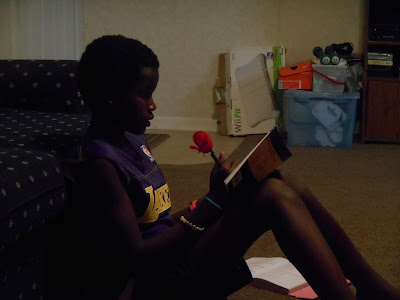 |
| Kaleb working through the Middle School Survival Manual |
The first grading period is drawing to a close. If your child is struggling with study skills, teacher problems, peer pressure or friendship issues, this book might be for him. Reading it together will show your child you are willing to be involved in his education and that you value his success.
 |
| Kayla working through the Middle School Survival Manual |
 |
| Jasmine working through The Middle School Survival Manual even thought she's in 10th grade |
The quiz below is from chapter 2. Do it with your child and see how you both do!
Listen
effectively.
You spend more time listening than you
spend reading, writing, or talking. Most of your school day is spent listening,
but effective listening goes beyond just hearing the words. You need to
concentrate on what's said and understand it.
How much do you really know about
listening? Take the quiz below to find out.
1.
It's important to know whether you're listening to understand
directions, to learn something new or for another reason.
___ True ___ False
2.
The average person:
a.
Speaks about 500 words a minute but can hear and understand about 150
words
a minute.
b.
Speaks about 135 words a minute but can hear and understand about 500
words
a minute.
c.
Speaks about 330 words a minute and can hear and understand about 330
words
a minute.
3.
In class it's important to:
a.
Listen for both concepts and details.
b.
Listen for the big picture and forget the details.
c.
Concentrate on the details that might be on the test.
4. If you're bored or confused while your
teacher is talking you should:
a.
Text your best friend.
b.
Listen for new information and relate it to what you already know.
c.
Make your to-do list for after school.
d. Write down questions to ask the
teacher later.
Answers:
1. True.
You can relax when you're hearing a funny story or joke but when you're
hearing instructions you need to listen for step-by-step details. If you're
learning new material you have to listen to understand concepts. Knowing why
you're listening can help you tune in better.
2. B The average person speaks about 135 words
per minute and can hear and understand almost 500 words per minute. Since you
process information faster than your teacher speaks, it's easy to let your mind
wander. Don't. Use that time to think through what the teacher is saying and
relate it to things you already know. Think about questions you may have about
the information.
3. C
Sometimes you can focus on details and miss major concepts. You may be
so caught up in the details of a war that you miss why the war took place in
the first place. Or you might listen for concepts and miss important details.
Tie facts and concepts together in your mind while your teacher is talking.
4.
B & D It's hard to keep listening when you don't understand the material or
are bored. Listen for things you do understand and for interesting pieces of
information. Make note of what you need the teacher to clarify.
Listening involves more than hearing the
words. It requires thinking through and organizing information in your mind.
Chapter Two also talks about being prepared, talking notes, doing all assignments, reading effectively, starting projects early, and asking questions.
You can order it at your local Christian bookstore, or through amazon.


No comments:
Post a Comment